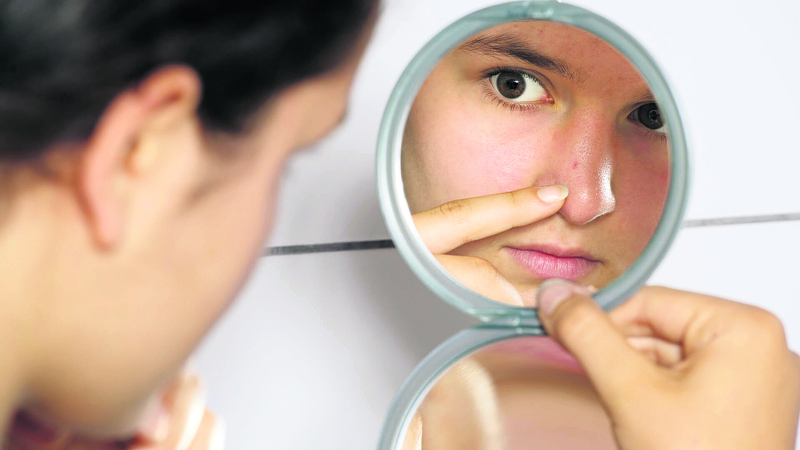
OR
Understanding adult acne
Published On: June 30, 2017 10:35 AM NPT

It is the bane of so many people’s life. Contrary to popular belief, acne can affect you beyond your adolescence. Be it in form of old bumps and scars or even recent breakouts, many find that they need to come in terms with adult acne. And, needless to say, it can be quiet distressing. Even Dr Sabina Bhattarai from Apollo Hospital shares that their own studies have proved that acne tends to have significant emotional trauma on those who suffer from it.
“From cases of low self esteem, lost confidence, isolation and so on, the effects of acne are aplenty and disturbing as well,” says Dr Bhattarai. In these scenarios, information and awareness can prove to be crucial. So The Week caught up with the dermatologist to talk about dealing with adult acne.
The causes
The basics: Hormones, genes and environment
The most common reason for adult acne is very simple: hormones. Dr Bhattarai explains that fluctuation in hormones is usually to blame, specifically, androgens i.e. male hormones like testosterone which causes the sebaceous glands (glands that produce oil) to enlarge and produce more sebum (oily substances). Women tend to get adult acne more often than men do. It is most common among women going through menopause.
However, factors like your genes and the environment also play a crucial role in your skin condition. Studies specifically suggest that some people have a genetic predisposition for acne. People who have this are prone to adult acne. Similarly, environmental factors like air pollution don’t help your case.
Stress
“Cells that produce sebum have receptors for stress hormones,” informs Dr Bhattarai. She even adds that at times it’s a vicious circle because having more acne increases more stress and that in turn again flares up the acne. According to her, there have been many studies that back this claim. Stress can be a very influential source of hormonal changes.
Using wrong products
Dr Bhattarai insists that even simple things like regularly oiling your hair whilst you have oily skin can lead to future acne problems. We have to ensure that the lotion or any other products we are slathering on aren’t going to clog your pores and make matters worse. “If you have oily or combination skin and are prone to breakouts, you should be using skincare products labeled oil-free, non-comedogenic, or water-based,” says Dr Bhattarai. Where the wrong products can bring on all sorts of trouble, using the right products can also have instant positive influences. So feel free to consult experts on the matter. There are specific face washes, lotions, gels and skin care routines designed for different types of acne.
The myths
Cleansing is recommended for everybody.
Aggressive cleaning or over washing your face in general is a bad decision. It can cause irritation and causes acnes to flare up. Pay attention to the changes on your skin and the timing of such routines, suggests Dr Bhattarai. “Sometimes it takes patients time to put two and two together. Even cleansing or facial treatment at the parlor can cause problems,” she says.
Certain foods may cause breakouts.
There are many people who believe this. Chocolates and fatty foods are often the usual suspects here. However, there aren’t any significant studies that prove the relation between your food intake and acne problem. So this belief is still quiet controversial.
You may squeeze your pimples once you see pus develop.
“This couldn’t be more wrong,” says Dr Bhattarai. As far as she is concerned, in the case of pimples, it’s best to adopt the ‘no touch’ policy. “Just don’t do anything,” she says. Even after you see a pus point, don’t pick on your acne. Once the bacteria spreads, it can only lead to more trouble. If that trouble isn’t instant then it will rear its ugly head in the future, in the form of pigmentation, scaring or more breakouts. You make yourself more vulnerable by trying to get rid of one by squeezing.
Acne is acne, they are all the same.
Unfortunately many people choose to self treat themselves with this thought in mind but again, this is completely false. Starting from blackheads and whiteheads to papules and pustules, there are several categories of acne.
Further, if you have got a face full of large, red, inflamed blemishes that seem to last for months, chances are you have got one type of severe acne: nodules, cysts, or acne conglobata. These are indicative of a deeper condition than your average acne type and can cause more severe and permanent damage to your skin if left untreated. If over-the-counter treatments aren’t clearing these types of blemishes after a few weeks, it’s time to see a dermatologist for stronger, prescription-strength medicine.
You may want to think about all this before attacking your pimples.
Treatment
With all the experience that she has had with her patients, Dr Bhattarai highly recommends people not to take the acne problem lightly. “There are many mothers who consider the acne problem in their children as a mere phase, but this is a chance you might not want to take,” she says. Dr Bhattarai begins by talking about the emotional toll, especially among teenagers, but concludes that when it comes to acne, prevention is certainly better than cure.
There are medications and ointments that can help curb the problem before it gets out of hand. Getting treatment at the right time can save a lot of trouble. Even though, there are laser treatments, chemical peels, and other procedures even for acne scars and such, these options are often expensive and time consuming. According to Dr Bhattarai, treatment is often simple and you shouldn’t feel ashamed to seek medical help for it. The repercussions of not doing so, and on time, might be huge.
You May Like This

Parenting modern-day kids
Our expectation of children is not realistic. We punish them for not performing well though they are doing well. ... Read More...

Understanding Shiva
The poison kalakuta is one of the strongest metaphors for all greed, desire, anguish and anger which we erringly... Read More...

NC, CPN (MC), UDMF reach 3-pt understanding
KATHMANDU, Aug 2: Nepali Congress, CPN (Maoist Center) and United Democratic Madhesi Front (UDMF) have reached a three-point understanding on... Read More...



Just In
- World Malaria Day: Foreign returnees more susceptible to the vector-borne disease
- MoEST seeks EC’s help in identifying teachers linked to political parties
- 70 community and national forests affected by fire in Parbat till Wednesday
- NEPSE loses 3.24 points, while daily turnover inclines to Rs 2.36 billion
- Pak Embassy awards scholarships to 180 Nepali students
- President Paudel approves mobilization of army personnel for by-elections security
- Bhajang and Ilam by-elections: 69 polling stations classified as ‘highly sensitive’
- Karnali CM Kandel secures vote of confidence
















Leave A Comment